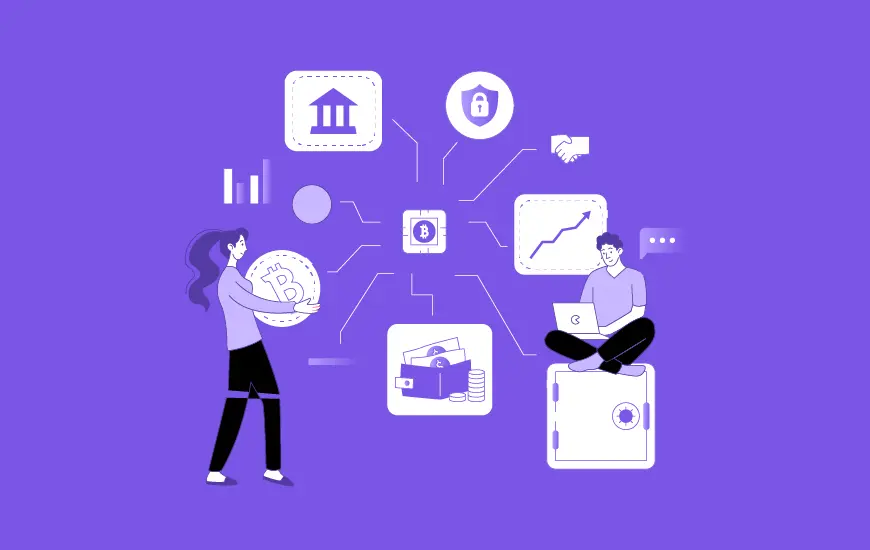In today’s fast-paced financial landscape, blockchain technology has emerged as a transformative force. As a seasoned expert in the field, I’m excited to delve into the benefits of blockchain technology and its potential to revolutionize the finance sector. This exploration will highlight how blockchain is not just a buzzword but a fundamental shift in how we conduct transactions, manage data, and enhance security.
Key Benefits of Blockchain Technology in Finance
Enhanced Security
Blockchain technology fundamentally transforms the security landscape in finance. By utilizing advanced cryptographic techniques, each transaction is securely linked to the previous one, creating an immutable chain of data. This structure makes it nearly impossible for malicious actors to alter or delete transaction records. As a result, financial institutions can significantly reduce the risk of fraud, hacking, and unauthorized access to sensitive information. With the added layer of security, clients can engage with financial services with greater confidence, knowing their data is protected.
Increased Transparency
Transparency is a hallmark of blockchain technology, and it serves as a critical tool for building trust in financial transactions. Unlike traditional systems where information is often siloed, blockchain allows all parties involved in a transaction to access a single, immutable version of the truth. This visibility enables stakeholders to verify transactions in real-time, reducing disputes and fostering accountability. For financial institutions, this means improved customer relations, as clients can independently verify the legitimacy of their transactions without relying solely on the institution’s assurances.
Reduced Costs
Cost efficiency is one of the most appealing benefits of blockchain technology. By removing intermediaries from the transaction process—such as banks, clearinghouses, and payment processors—blockchain significantly lowers transaction fees. This is particularly evident in cross-border payments, where traditional methods can incur high costs and delays due to multiple intermediaries. With blockchain, these transactions can be executed directly between parties, resulting in minimal fees and faster processing times. For businesses and consumers alike, this translates to significant savings and improved financial flexibility.
Faster Transactions
In the fast-paced world of finance, speed is paramount. Traditional banking systems often require several days to settle transactions, especially for international transfers. Blockchain technology addresses this issue by enabling near-instantaneous transaction confirmations. With blockchain, financial transactions can be processed 24/7, eliminating the delays associated with traditional banking hours and procedures. This efficiency not only benefits consumers seeking quick access to funds but also enhances liquidity in financial markets, allowing institutions to react swiftly to market changes.
Improved Traceability
Traceability is crucial for compliance and auditing in the financial sector. Blockchain technology offers a transparent and immutable audit trail for all transactions. This feature enables financial institutions to track the flow of funds in real-time, making it easier to comply with regulatory requirements and identify any anomalies or fraudulent activities. By simplifying the auditing process, blockchain enhances the overall governance of financial operations, allowing institutions to maintain high standards of accountability and integrity.
Greater Accessibility
Blockchain technology is a powerful tool for promoting financial inclusion. Traditional banking systems often exclude large segments of the population, particularly in developing regions where access to banking services is limited. Blockchain democratizes access to financial services by enabling anyone with an internet connection to participate in the economy. This can include accessing loans, savings accounts, and investment opportunities through decentralized finance (DeFi) platforms. As a result, individuals and small businesses previously marginalized by traditional banking can now engage in economic activities that were once out of reach.
Smart Contracts
Smart contracts are self-executing contracts with the terms of the agreement directly written into code. This innovation allows for automatic execution of contracts when predetermined conditions are met, eliminating the need for intermediaries. In finance, smart contracts can streamline various processes, such as loan approvals, insurance claims, and trade settlements. By automating these transactions, financial institutions can reduce processing times, minimize human error, and lower operational costs, ultimately enhancing the customer experience.
Tokenization of Assets
Tokenization is a groundbreaking concept that allows real-world assets—such as real estate, art, or stocks—to be converted into digital tokens on a blockchain. This process enables fractional ownership, meaning that investors can buy smaller portions of high-value assets, thereby increasing market participation. Tokenization also enhances liquidity by making it easier to trade these assets on secondary markets. For financial institutions, embracing tokenization opens new avenues for revenue generation and customer engagement, as it provides innovative investment opportunities for a broader audience.
Embracing the Future of Finance
The benefits of blockchain technology are profound and multifaceted, representing a seismic shift in the financial industry. Enhanced security, increased transparency, and significant cost reductions are just a few of the advantages that blockchain offers. As financial institutions and businesses continue to explore and implement this transformative technology, we can expect a more secure, efficient, and inclusive financial ecosystem.
To thrive in this new landscape, it is imperative for industry stakeholders to understand the potential of blockchain technology and embrace it wholeheartedly. The future of finance is built on blockchain, and those who adapt will undoubtedly lead the way in redefining how we conduct financial transactions. By leveraging the unique benefits of blockchain, we can create a more resilient and dynamic financial system that benefits everyone.
Learn more about blockchain benefits at Blockchain Global Network!
Q&A
- What are the primary advantages of using blockchain technology?
Blockchain technology offers a multitude of advantages, including enhanced security through its decentralized and tamper-evident ledger, increased transparency with open, immutable records, and reduced operational costs due to the elimination of middlemen. Additionally, it enables faster transactions by streamlining and automating processes, which is especially valuable in sectors like finance and supply chain management.
- How does blockchain technology impact transaction transparency and security?
Blockchain’s innate design ensures exceptional transparency as every transaction is recorded on a ledger that is accessible to all network participants. This visibility deters fraudulent activities and ensures accountability. On the security front, since each transaction is encrypted and linked to the previous transaction, the blockchain creates a secure and unalterable chain, making it nearly impervious to unauthorized alterations and cyber attacks.
- Can blockchain technology be used to improve supply chain management?
Yes, blockchain can significantly enhance supply chain management by providing a real-time, immutable record of the movement of goods from origin to destination. This transparent trail helps reduce errors, fraud, and inefficiencies. It also improves inventory management, reduces delays, and ensures the authenticity of products, which is particularly beneficial in industries where provenance and authenticity are crucial.
- What are the cost benefits of implementing blockchain technology?
By streamlining and automating various business processes with blockchain, organizations can experience a notable reduction in operational costs. The technology minimizes the need for third-party intermediaries, reduces transaction fees, and cuts down on delays and redundancies. This leads to a more efficient allocation of resources, savings on administrative costs, and an overall increase in profitability.
- In what ways does blockchain technology promise to enhance data integrity?
Blockchain’s structure is inherently resistant to data modification. Each block contains a cryptographic hash of the previous one, creating an unbreakable chain. Since altering any piece of information would require consensus across the entire network, blockchain promises unparalleled data integrity. This makes it an ideal solution for industries where maintaining the accuracy and consistency of data is mission-critical.



RELATED POSTS
Toby Airdrop: A complete guide to participation from A to Z
Participate in the Toby Airdrop...
Zircuit Airdrop – Breakthrough Potential for Early Investors!
Zircuit Airdrop is not just...
U2U Super App: A Central Hub for Asset Management, Privacy, and Blockchain Interactions
The U2U Super App is...
What is a Bullish Run? Exploring Its Impact on Investment Strategies
What is a Bullish Run?...
Blockchain Backlash: Navigating the Turbulent Waters of Application Security
Understanding the Ripple Effect of...
Cryptocurrency Payments: Unleash the Future of Seamless Transactions
Integrate cryptocurrency payments securely. Ensure...
What is ACA Coin? Learn about Acala Network Token
ACA Coin is a vital...
Fuel Airdrop – Grab the opportunity to receive free Fuel tokens
The Fuel airdrop is an...
James Seyffart: A leading expert on ETFs and Cryptocurrency
James Seyffart is a prominent...
Gala Airdrop and 6 Tips to Maximize Gala Game Rewards
To maximize rewards from the...
Blast Airdrop – Tips for Earning KRO Tokens Easily
Earning KRO tokens from the...
SonicX Airdrop – Exciting Tap-to-Earn Gaming Experience
SonicX airdrop offers an incredibly...
Binance Charity and the $1 Million USD Airdrop Campaign for Flood Relief
Binance Charity is a pioneer...
Helios consensus: The engine powering U2U Chain’s blockchain revolution
Ever wondered how U2U Chain...
Greg Maxwell: Influence in the Cryptocurrency world
Greg Maxwell is one of...
Advantages of Blockchain Transparency: Unveiling the Trust Revolution
Unlock the Advantages of Blockchain...